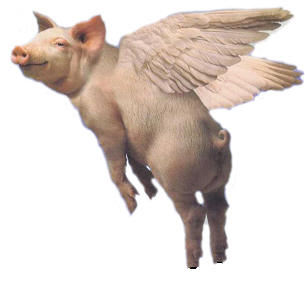
Since the late 1970’s America has been on a quest to eradicate fat from our diets as a way to remove it from our middles, and at the forefront of that quest was a low fat diet. What this meant for us was replacing animal fats with vegetable fats, hydrogenating fats, using increased amounts of salt and sugar to replace the flavor lost by eliminating fats, and in general completely changing the quality of the food we consume. Now, we have evolved those principles and created a veritable science project that is our food production and what passes as food is often just a bunch of chemicals, enhanced with more chemicals to replicate the natural flavor profile we associate with a particular food, like chicken.
One of the saddest casualties of this war on fat, is the pig. I find it ironic that as our pork supply has gotten increasingly lean, our obsession with bacon has grown exponentially. Over the years commercial pork producers have focused on raising leaner and leaner animals. One website boasts “If you are afraid pork will increase the fat in your diet, worry no more. Today’s pork is about 23 percent leaner and 26 percent lower in cholesterol than it was a dozen years ago. Put in simpler terms a lean pork chop has about the same fat level as a chicken breast with skin, or a tablespoon of salad dressing. So feel free to indulge and enjoy the moment.” Yes, feel free to indulge and enjoy a dry and flavorless piece of pork, only vaguely reminiscent of the delicious and juicy pork you recall eating as a child.
If you are a meat eater, there are many health benefits to choosing meat from pastured animals. Meat, eggs, and dairy products from pastured animals are better for your health. According the web site Eat Wild, “compared with commercial products, they offer you more “good” fats, and fewer “bad” fats. They are richer in antioxidants; including vitamins E, beta-carotene, and vitamin C. Furthermore, they do not contain traces of added hormones, antibiotics or other drugs.” Another benefit is that pastured livestock produces meat with lower levels of saturated fat and higher levels of vitamins, minerals, CLA, and Omega 3. They are raised without medications because they don’t need them as they’re not crammed together in unhealthy conditions.
Industrial farming of pigs is doing a number of things to damage the swine as well as the human population. These CAFOs (commercial animal feeding operations) are obscene. They cram animals into small spaces where they stand all day on concrete slats. The commodity market uses only a few breeds, bred to be as lean as possible. Smithfield is the largest producer of pork in the US, and in June it was sold to Hong Kong-based Shuanghui International Holdings. Chances are, if you buy any ham or pork you are buying a Smithfield product as they package under several different names.
Another nightmarish aspect to this industry is the slaughterhouses, and what happens to the people who work there. These workers, rather than learning the art of butchering, handle hundreds if animals daily, standing in the same place and making the same prescribed primal cuts day in and day out. This repetitive work results in injuries and once they can no longer perform the work, these unskilled laborers, many of whom are illegal immigrants, or part time workers making minimum wage, and without insurance, are fired with no recourse, and now unable to perform manual labor due to work related injuries.
Pigs raised on industrial farms, can’t be pigs. They can’t wallow, but rather live in cages suspended over waste lagoons that drain into nearby land and streams. Pigs need to wallow, which means rolling around in water and mud. They do this to cool off, as like dogs, they don’t sweat. Temple Grandin has brought a lot of attention to the treatment of industrial farm animals, and has been instrumental in many positive changes to husbandry practices. That being said, as with so many things we, as consumers are constantly facing (or choosing not to) making choices that are more economical in the short term vs. considering the long-term effects of those choices. If you knew you had to pay twice as much for locally, humanely raised pork, beef, or chicken, would, or could you make a decision to halve your consumption? Could you decide that to support local farms, and stop supporting an industry that pollutes the land and water, harms animals, and delivers a lower quality, albeit cheap, product would be a better long-term decision?
As a consumer, it can be challenging to try to find pork that isn’t raised on an industrial farm, and if you do, you will absolutely pay a premium price for it. Heritage pork is starting to become more widely available as chefs and restaurants are demanding it, and so creating a market for it. Heritage Foods USA is a supplier committed to connecting farmers with people, stores and restaurants. You can find it a farmers’ markets, and independent butchers. Some grocery stores are starting to offer grass fed beef, and locally raised pork. I can buy both at my local Whole Foods Market. For me it means fewer meat meals, though it also means I am eating something that is better for my health and for the environment, and I am supporting farms not factories.
Even if the cost seems prohibitive to do it on a regular basis, I urge you to see if there is locally farm raised pork available near you, and to try it. You may find the taste familiar if you’re old enough, but it may seem strange at first, it will taste like pork.
.jpg)
Image Courtesy of The Butcher’s Apprentice http://butchersapprentice.wordpress.com/





.jpg)





Rosanna Cruz Rogacion - I love the pig with wings, and the adorable grazing pig. I love pigs, that’s why I can’t eat them. If I could, I’d rescue them too, but I already have far to many rescued animals under my care. But if I don’t see an adorable pig picture, I can eat bacon and here in the Philippines, we have a delicacy called “chicharon,” which is deep fried pig skin. It’s very tasty, actually.
nrlowell@comcast.net - I understand your feelings about pigs, they are quite lovely and noble! We have chicaron here too, and during the low-carb days was a very popular snack.
Larks - Great piece. We go to the farmer’s market every Sunday and buy most of our food for the week including our meat. It’s had an interesting impact on our overall diet because our food budget is still very modest and while farmer’s market veggies cost the same or less than organic grocery store fare, meat is exponentially pricier so we end up eating way less of it. But man, oh, man the couple of nights a week we do eat a pork chop or a couple strips of bacon? SO. YUMMY. Ethical concerns aside it would be hard to go back to the CAFO stuff just based on taste. Weirdly, going nearly meatless has turned us into meat connoisseurs.
nrlowell@comcast.net - I am finding the same thing! That combined with my daughter giving up meat has really shifted my POV as well as shopping habits. You should check and see if your pork guy/gal sells guancialli and make the best carbonara you had this side of the Atlantic Ocean!
The Virtue of the Pig | The Bloppy Bloggers Gaz... - […] Since the late 1970′s America has been on a quest to eradicate fat from our diets as a way to remove it from our middles, and at the forefront of that quest was a low fat diet. […]